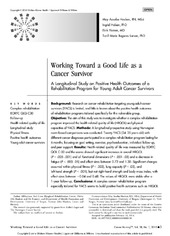Working Toward a Good Life as a Cancer Survivor. A Longitudinal Study on Positive Health Outcomes of a Rehabilitation Program for Young Adult Cancer Survivors
Peer reviewed, Journal article
Published version
Date
2015-01Metadata
Show full item recordCollections
Original version
https://doi.org/10.1097/ncc.0000000000000138Abstract
Background: Research on cancer rehabilitation targeting young adult cancer survivors (YACS) is limited, and little is known about the positive health outcomes of rehabilitation programs tailored specifically for this vulnerable group. Objective: The aim of this study was to investigate whether a complex rehabilitation program improved the health-related quality of life (HRQOL) and physical capacities of YACS. Methods: A longitudinal prospective study using Norwegian norm-based comparisons was conducted. Twenty YACS (24Y35 years old) with different cancer diagnoses participated in a complex rehabilitation program lasting for 6 months, focusing on goal setting, exercise, psychoeducation, individual follow-up, and peer support. Results: Health-related quality of life was measured by EORTC QOL C-30 and the scores showed significant increases in overall HRQOL (P < .005-.001) and all functional dimensions (P < .001-.05) and a decrease in fatigue (P < .000-.05) and effect sizes between 0.72 and 1.30. Significant changes occurred within physical fitness (P < .005), lung capacity (P < .05), and left-hand strength (P < .001), but not right-hand strength and body mass index, with effect sizes between -0.04 and 0.48. The values of HRQOL were stable after a 1-year follow-up. Conclusions: A complex cancer rehabilitation program especially tailored for YACS seems to build positive health outcomes such as HRQOL.

